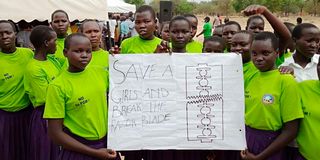Why implementation of Anti-FGM law remains a challenge

Students of Adurokoit Girls Secondary School in West Pokot County, display a poster with anti-FGM and early forced marriages at Tandapos area during a sensitization ceremony last year.
What you need to know:
- Although Kenya was to report zero new cases of FGM by the end of last year, thousands of girls between the age of 12 and 17 years continue to face the unkind cut.
- Residents in pastoral areas, where the vice is rampant, have no information about the anti-FGM law due to illiteracy and ignorance.
Despite Kenya having passed the anti-Female Genital Mutilation (FGM) law in 2011, that prohibits the vice, it is still rampant in many pastoral communities.
Part four of the Act criminalizes FGM. The Act also provides that if FGM if carried out and the victim dies, the perpetrator will be liable to life imprisonment.
Although Kenya was to report zero new cases of FGM by the end of last year, with stakeholders putting in effort, thousands of girls between the age of 12 and 17 years continue to face the unkind cut.
According to United Nations Children’s Fund (Unicef), FGM in West Pokot County stands at 75 per cent, posing great danger to women’s reproductive health and their wellbeing.
According to anti-FGM activists in West Pokot County, residents in pastoral areas have no information about the law due to illiteracy and ignorance.
Custodians of law
A Pokot elder, Selina Chepkeriker popularly known as ‘Mama Culture’, while speaking to Nation.Africa called on the county and national government to set aside funds for the translation of the anti-FGM law in the local languages. This, she said would help sensitize the people, and enforce the law to help reduce the vice in the area.
“Elders are the custodians of the law but still there is a crisis in implementation of the anti-FGM law,” she said.
She argued that although the ban helped in changing attitudes towards the practice, it has also driven the practice underground.
“It was recognized that FGM was considered an important rite of passage between childhood and adulthood for girls, based on the importance of controlling female sexuality to maintain chastity and family honour, and to make girls marriageable,” she said.
She pointed out on the need for awareness and education campaigns to change cultural perception and beliefs on FGM and child marriage, and acknowledging the practices as human rights violations with harmful consequences.
“Some of the challenges are the absence of sufficient schools to educate the young generation about the disadvantages of the practice,” she said.
She noted that politicians in the area have become a stumbling block to the law.
“Concerned national and local authorities should work collaboratively to put in place protective measures such as safe houses and shelters within at-risk communities, to protect girls from child marriage and FGM; and to ensure they continue with their education,” she stated.
Ms Chepkeriker warned those in support of the vice, saying the law would catch up with them.
“Ignorance is no defence; people should be aware of the law,” she said.
Prevalence rate
She explained that the perpetrators have changed tact and are now doing the act at night.
“We are happy that the fight is yielding fruits because ten years ago when I initiated such a campaign, the prevalence rate of FGM in this area was 100 per cent , but through many sessions of sensitization, workshops and seminars among other forums, the practice has reduced and many people are leaving it,” she said.
She reiterated that local communities affected by FGM are still unaware of the existence of the law.
“Lack of acceptance of laws condemning the practice is a reason cited for the continuing high prevalence in many African communities. Some critics argue that the concerned communities are often not involved in the legislative processes. Thus, communities may feel that laws that challenge their norms and culture, are imposed from outside,” she said.
Bob Masika a representative of Deutsche Gesellschaft für Wertpapiersparen (DSW) organization noted that the lack of data on FGM from the county and national government, has also hampered efforts in ending FGM.
World Vision Alale Anti-FGM Project officer David Krop, said anti-FGM laws led to an rise in cross-border FGM, as perpetrators attempt to avoid prosecution.
“The challenge of enforcement comes into play because African borders are porous, lack of coordination between law enforcement agents of neighbouring countries, varying enforcements of the law, and in unlucky situations, bordering a country that does not criminalize FGM within its laws,” he said.
Mr Krop added that for the law to be effective, it has to be implemented by the government, be respected by the citizens, and applied by the judicial bodies.
Forced marriages
“Cultural settings or attitudes towards the law can impede implementation of an anti-FGM law. Despite the provisions and the longevity of the law, the prevalence rate of FGM in the region has not significantly changed. This goes to show that the law needs more supporting elements for it to be effective.” he said.
Pokot Girl Child network Coordinator Teresa Lokichu, challenged the government and security apparatus to help in enforcing the anti-FGM law to protect girls from the vices of FGM and early, forced marriages.
She said security organs should ensure laws against FGM are implemented specifically with regard to proper investigation and prosecution of violations.
Pokot North Sub-county Commissioner James Ajuang’, said they have decided to work with NGOs and local leaders to sensitize people, and prosecute those who take part in FGM.
“This is a deep-rooted culture and you cannot wipe out a culture in one go. But one day, we hope we shall end it as more girls attend school and become aware of its dangers.”





